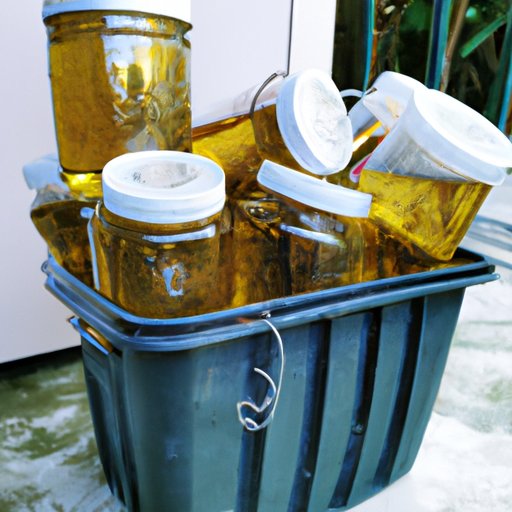Introduction
Cooking with oil is a popular way to add flavor to food and create delicious meals. Every day, millions of people around the world use cooking oil for frying, baking, and other culinary applications. Unfortunately, most of this oil ends up being disposed of improperly. It’s important to understand how to properly dispose of used cooking oil in order to avoid environmental damage and potential health risks.
Definition of Used Cooking Oil
Used cooking oil is any type of oil that has been heated to high temperatures and used for cooking. This includes vegetable oil, olive oil, canola oil, and animal fats such as lard or butter. When heated, these oils break down into fatty acids and glycerol molecules, which can be harmful to the environment if not disposed of correctly.

Overview of Dangers of Improperly Disposing Used Cooking Oil
When used cooking oil is dumped down the sink or flushed down the toilet, it can clog pipes and cause sewer backups. If it enters waterways, it can disrupt the natural balance of aquatic ecosystems by killing off oxygen-producing organisms. In addition, when used cooking oil is burned, it releases toxic chemicals into the air, which can cause respiratory problems for humans and animals.
Proper Procedures for Disposing Used Cooking Oil
The best way to dispose of used cooking oil is to store it in an appropriate container and take it to a designated collection site for recycling. Most local governments have programs that allow residents to recycle their used cooking oil. Alternatively, you can check with your local waste management company to see if they offer collection services.

Storing Used Cooking Oil in Appropriate Containers
When storing used cooking oil, it’s important to use a container that won’t leak or spill. Plastic containers with tight-fitting lids are ideal for this purpose. Make sure to label the container clearly with its contents so that it is easy to identify when you take it to the recycling center. It’s also a good idea to keep the container away from direct sunlight or other sources of heat.

Local Recycling Programs for Used Cooking Oil
Many local governments have programs that allow residents to recycle their used cooking oil. Check with your local city or county government to find out if there is a program available in your area. Some programs may require you to pay a fee for collection, while others may provide free pickup services. You can also contact restaurants, bakeries, and other food-related businesses in your community to see if they participate in a used cooking oil recycling program.
Strategies to Reduce the Amount of Used Cooking Oil Produced
In addition to proper disposal, there are several strategies that can be used to reduce the amount of used cooking oil produced. One strategy is to reuse or recycle used cooking oil. For example, some restaurants filter and reuse their cooking oil multiple times before it needs to be discarded. Another strategy is to install grease traps in home and commercial kitchens. Grease traps capture solid particles and oils, preventing them from entering plumbing systems.

Benefits of Reusing or Recycling Used Cooking Oil
Reusing or recycling used cooking oil has several benefits. One benefit is that it reduces the amount of waste that needs to be processed at landfills. In addition, it helps to reduce the environmental impact of burning used cooking oil, as well as the costs associated with purchasing new oil. Finally, reusing or recycling used cooking oil can help to conserve energy, since it takes less energy to process recycled oil than to produce new oil.
Conclusion
Disposing of used cooking oil properly is essential in order to protect the environment and avoid potential health risks. The best way to do this is to store it in an appropriate container and take it to a designated collection site for recycling. There are also several strategies that can be used to reduce the amount of used cooking oil produced, such as reusing or recycling it and installing grease traps in home and commercial kitchens. Reusing or recycling used cooking oil offers numerous benefits, including reducing environmental impact, lowering costs, and conserving energy.


